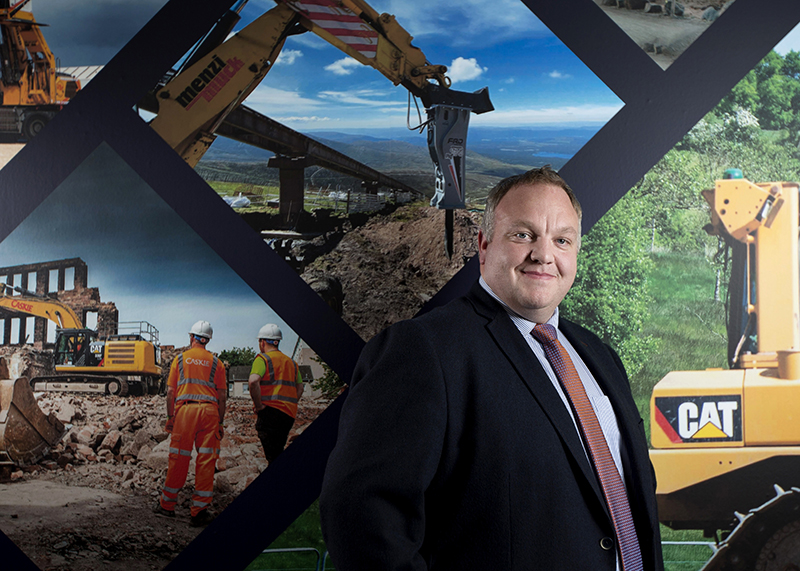
Outgoing Scottish Plant Owners Association (SPOA) president Callum Mackintosh reflects on his term in office and explains why the journey both challenged and exceeded all expectations he had going into the role.
Q) What would you consider to be your biggest achievement(s) as president of the SPOA?
A) I think that my time as president of the SPOA has been a chapter of growth, challenges, and meaningful achievements for the association. The privilege of serving as president, following in the footsteps of some remarkable plant men who have significantly shaped our industry, is something I deeply cherish.
One of the most remarkable and historic milestones was the successful establishment of our own dedicated offices and the initiation of our in-house staffing. This accomplishment holds a special significance as it had been a longstanding aspiration that previous presidents had discussed but never managed to bring to fruition. The realisation of this vision symbolises not only progress but also a renewed commitment to enhancing the association’s structure and service to its members.
Moreover, I am immensely proud to have been honoured with an Outstanding Leadership Award at the Trade Association Forum Awards. This recognition serves as a testament to the dedication and relentless effort invested in reshaping the association’s trajectory. Such acknowledgment reinforces the notion that transformative and maybe even disruptive leadership can indeed yield impactful results.
In addition to these achievements, the revitalisation of association events, fostering diversity within our sector, and driving positive change within the committee are all milestones that I hold dear.
As I step back, I do so with a sense of pride in the transformation I’ve helped facilitate, and with a dedication to ensuring the continued success of the association. I am confident that the foundation built, and the progress achieved will serve as a solid platform for future endeavours. It is my hope that my accomplishments will serve as a catalyst, motivating my successors to strive even further, to surpass the heights we’ve reached, and to chart a course toward even greater achievements for the SPOA, its members and the industry.
Q) What were the biggest challenges you faced as president?
A) I was honest when I became president about what I wanted to do and what I thought needed to change. As the youngest president of the SPOA, I came to the post with a different approach and attitude to recent presidents. Whilst I know that some members found this refreshing, I did also meet some resistance. The SPOA marked its 70th anniversary during my time as an office bearer, and I think it’s fair to say that the association had not changed drastically over that time. I had a vision for what I wanted to achieve for members and, what I still believe was essential to ensure the future of the SPOA, but delivering that vision often meant going against the grain and breaking with tradition. This was challenging at times.
On a personal note, just prior to assuming the role of president, I faced an immense personal loss — the death of my youngest brother at the age of 21. Naturally, assuming a new role, grieving for the loss of my brother and facing other external pressures for the industry like the loss of rebate on red diesel and knowing the support for change within the SPOA was not universal, all added to the pressure that comes with being president.
On reflection, these challenges have been tests of my resilience and determination, underscoring the multifaceted nature of leadership and the depth of commitment required to effect meaningful progress.
Q) Did you achieve everything you set out to do as president?
A) There is a certain bittersweetness to this. While I certainly had ambitious aspirations when I first stepped into the role of president, I must acknowledge that the journey took some unexpected turns that both challenged and exceeded my initial expectations.
Undoubtedly, I set out to achieve a great deal. The transformation of the association from what was seen as a stagnant trade body focused only on the central belt of Scotland to a vibrant and thriving entity was a paramount goal. However, what transpired over the course of my tenure surpassed even my loftiest ambitions.
I found solace and validation in the appreciation and support of the association’s members. Their recognition of the positive impact of the changes fuelled my determination and provided a sense of purpose that extended beyond any initial checklist of objectives.
In essence, while I may not have achieved every single detail I initially set out to, the journey itself has been an accomplishment of great significance. The association’s transformation, the newfound engagement of our members, the financial sustainability and the revitalisation of our operations all serve as markers of a successful tenure — one that leaves me both proud and humbled.
Q) Do you think the industry has undergone changes whilst you were in office and if so which changes?
A) Absolutely, the industry has witnessed significant changes during my tenure. Particularly the accelerated drive towards achieving net-zero emissions. This impetus has brought about notable shifts in how we power and fuel plant and equipment. This transformation, the race among manufacturers to launch battery and hydrogen powered machinery, has been exciting and can only be compared to when the industry went from rope to hydraulics and before that from steam to diesel.
We also saw a pivotal change in the sector’s entitlement to red diesel, which directly impacted around 90% of our members. In the lead-up to the changes that took effect on April 1, 2022, I actively engaged in meetings with HM Treasury and HMRC whilst also collaborating with other organisations like the SPOA, aiming to ensure that our members’ interests were well-represented. In response to this significant shift, we produced comprehensive industry guidance titled ‘Transitioning from Red Diesel,’ offering invaluable support to our members and their peers as they navigated these regulatory changes. My commitment extended to assisting numerous members who faced challenges in retaining their entitlement after encountering erroneous refusals from fuel suppliers. By advocating for their rights and offering guidance, we ensured that their access to fuel remained uninterrupted keeping their sites working.
The persistent challenge of narrowing the skills gap remains a concern, and the absence of significant change since 1950 is notably disheartening, it’s on SPOA record as the most consistent challenge. This urgency prompted my drive to purchase the association’s own plant simulator back in June — a vital tool for upskilling operators and fostering fresh talent through engaging career pathways. Additionally, I advocated for the introduction of new, subsidised training courses like the 3D machine control course, hire controller training or our hire achievers course tailored for business leaders to help them overcome today’s challenges.
Q) What was your highlight from your time in office?
A) The establishment of our own office and the employment of full-time staff stands as a historic milestone, representing the first such occurrence in 73 years. This achievement embodies progress and signifies a renewed commitment to serving our members with excellence. I look forward to seeing the team grow in the coming year.
Additionally, the opportunity to mentor and guide our apprentices while championing diversity within our sector brought a profound sense of fulfilment. These efforts aligned with my core values and underscored the association’s dedication to fostering growth and inclusivity. Introducing an annual award for Scottish apprentice plant operator of the year, alongside the Scottish plant mechanic of the year, is a particular highlight for me. The recipients of this award, four apprentices awarded so far, remain individuals I enjoy having regular contact with.
Moreover, the people I have had the privilege of meeting and the relationships I have forged along this journey have been an exceptional highlight of my tenure. There are too many to mention but individuals like Chris Blake at the National Construction College, who embraced my approach to drive positive change at the college, and plant operator, Fiona Wilson, who wholeheartedly welcomed my initiative to provide a platform for women in the industry to discuss and address pertinent issues. Collaborating with companies like Danfoss, JCB, and Caterpillar has been enlightening and a true privilege.
Lastly, I take pride in the distinction of being different. Throughout my presidency, I made a conscious effort to break away from convention, reinventing our events and creating strategies. This departure from the norm not only breathed new life into the association but also ensured the financial success of each endeavour.
Q) Do you think being president of the SPOA required you to develop new skills?
A) Undoubtedly, my tenure as president of the SPOA provided an opportune platform for the refinement and cultivation of various skills, some of which I already possessed, while others were acquired and honed during my time in office.
Tolerance, an essential trait, became even more crucial as I navigated the diverse perspectives and opinions within the committee. This skill was not entirely foreign to me, but my time as president demanded a heightened level of tolerance, allowing me to embrace differing viewpoints and bridge gaps that often arise in leadership positions.
Diplomacy, something I had always strived for and improved upon, was an area where my presidency saw notable growth. The delicate art of forging common ground and fostering collaboration, even amidst challenges, underscored the critical importance of diplomacy in leadership. I was able to take my existing diplomatic skills and elevate them to new levels, resulting in more effective communication and relationship-building. It’s important to note that effective leadership also demands the occasional deployment of a metaphorical sledgehammer. While diplomacy is a cornerstone, there are instances where assertive action is essential to drive progress. I’ve never shied away from wielding such assertiveness when needed, recognising that a balanced approach is key to achieving meaningful results.
Public speaking, on the other hand, was a skill I improved on whilst on the job. While I had some experience in this area prior to my presidency, the demands of the role required me to harness the power of effective communication more comprehensively. Through numerous engagements and presentations, I not only refined my public speaking but also strategically employed it to drive positive change and enhance our association’s profile.
Q) What is next for you and what will your focus be as you remain active in the executive committee at the SPOA?
A) As I look ahead, a well-deserved break from my responsibilities within the SPOA is at the forefront. The physical and emotional investment I’ve poured into the association has left me in need of rejuvenation. My immediate priorities are my partner, my personal health and business ventures, allowing me to regain balance.
Once these aspects are restored, I am committed to maintaining a vigilant eye on the progress we’ve achieved. Both the SPOA, its members and the industry at large cannot afford any regression or a return to outdated attitudes. While my primary focus will be on personal wellbeing, I plan to continue contributing to the association. This involves working closely with the European Rental Association, leading the SPOA Industry Supplier Group, supporting colleagues like James Currie with our training initiatives, ensuring the Women in Plant group continues and spearheading efforts to bring new entrants to our brilliant industry.








